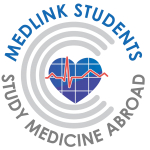
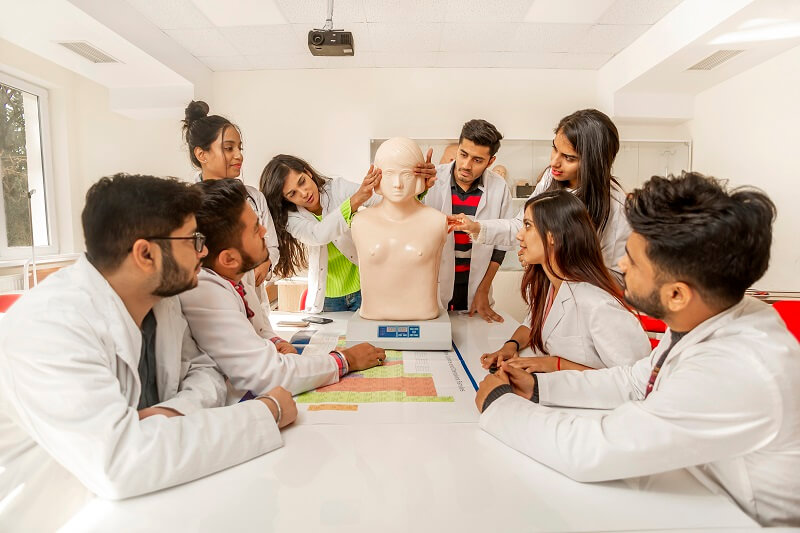
Enquire now and get a FREE assessment of your documents and available options.
We find you the perfect medical school to suit your needs & guarantee your entry.
On-ground support with help from medical students and doctors on campus.
Our doctors will help you register in the UK or other EU countries up graduation.
Studying medicine abroad expands students’ horizons both in an educational and cultural sense. Furthermore, aspiring doctors acquire self-reliance, discipline, and maturity as part of living in a foreign country. Consequently, international students gain a competitive edge in the job market thanks to their distinct backgrounds and skill sets.
For the past 20 years, it has become increasingly popular for aspiring doctors to study medicine in Europe in English. For some, the life-changing decision to study medicine abroad is the highly competitive admission requirements in their home countries. Other applicants meet the entry criteria but are forced to seek medical education in Europe because it’s more affordable.
Whatever your case, studying medicine in Europe should not be looked down upon or considered an alternative career pathway. The truth is that medical schools overseas offer the same high-quality education and facilities and are recognised by health organisations worldwide. This means you will be eligible for a career in medicine anywhere in the world.
The European universities that teach medicine in English are located in over 40 countries. Each of these universities has its own unique set of entry requirements. The only criterion of acceptance they all share is English language proficiency.
Other than that, you may have to sit an entrance exam in Biology, Chemistry, Physics, or Mathematics. Some exams will be simple multiple-choice questions, while others can be open questions or a combination of both. They may or may not consider your high-school science subjects grades.
There are hundreds of medical universities abroad, so entry requirements will always vary. The most common entry requirements for medicine in Europe are:
Whether you meet the entry requirements for medicine abroad, we can always guarantee entry into medicine or dentistry in Europe. Contact us, tell us what you are looking for in terms of medical education, and we will give you free options tailored to your preferences.
Depending on which country you choose to study medicine abroad, annual tuition fees can range from €3,000 to €30,000. These prices depend solely on the economic state of the corresponding country. More expensive options don't mean better quality of education because medicine is taught and learned the same everywhere.
Here are the general guidelines for the cost of studying medicine in Europe:
For a complete price comparison, check out our extensive list of medical universities in Europe. You can find detailed information about countries, programmes, tuition fees, living costs, curricula, and much more.
Meanwhile, here are the Top 5 universities to study medicine abroad at a low cost:
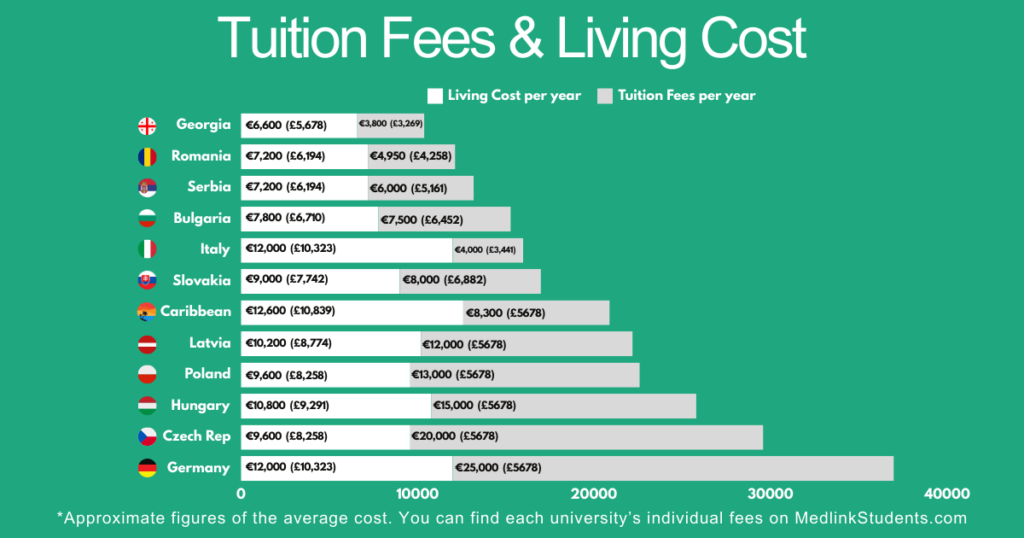

All of our partner universities are recognised by the World Health Organisation and listed in the World Directory of Medical Schools, which in most cases, is a primary degree recognition requirement.
Other common requirements include a course duration of at least 5,500 contact clock hours of study over a period of at least 3 or 4 years.
Medical degrees obtained from a European school will be recognised by the major medical councils worldwide. We've thoroughly researched and vetted these universities to ensure they comply with the best teaching quality standards. Graduates will be eligible to apply for a Doctor's licence in the country of their choice.
For example, you will be eligible to take the USMLE for the USA, the MCCQE for Canada, the PLAB/UKLMA for the UK, the PRES for Ireland, and the AMC clinical examination for Australia.


The majority of universities in Europe have Biology and Chemistry entrance exams as part of their admission requirements. There are, however, several which require no entrance exams:
You might have scored low on your entrance exam in your home country. Or perhaps you couldn’t afford the inflated tuition fees universities require nowadays. Don’t fret because beyond your home country lie excellent education opportunities for you to grasp in Europe.
There are countless reasons why one should consider studying medicine in Europe. It’s not only about the financial side of things or your state’s strict regulations and protocol. Europe is rich in diverse nationalities with their own cultures but also different educational systems. So, in addition to pursuing your dream of becoming a physician, you have a perfect “excuse” to explore the world!
We are leaving the exploration part for you, and we will now outline the top reasons why you should choose to study medicine abroad in English.
The medical degree you get when you graduate from a European university is recognised by the World Health Organisation and Medical Councils worldwide, including in the UK, USA, Canada, Ireland, Australia, the Middle East, Western Europe, and more. This automatically enables you to practise as a doctor in your home country or anywhere in the world.
There are hundreds of leading medical schools in Europe that teach in English and are open to international students. You will rarely see a reputable university that doesn’t have an English programme. This means you have the complete freedom to choose your desired destination according to your specific requirements.
Having an abundance of options to pursue medical education in Europe means that there will be less competition for entry. You will be in a different bracket where you will not compete for places with the local applicants.
You can apply for an unlimited number of medical schools abroad simultaneously, while in the UK, for example, you can only apply for a maximum of 4 at a time. Should you not get accepted into any of them, you would have to wait a year before trying again.
There’s no equivalent to the UMCAT, GAMSAT, BMAT, or any other irrelevant and complicated exam in Europe, so those are out of the list. You are only required to pass an entry test in Biology and Chemistry and a simple interview to evaluate your motivation to enter the world of medicine.
In many European universities, you can enroll in medicine without having to go through the hassle of an entrance exam. The European University of Tbilisi in Georgia is a brilliant example.
Tuition fees in most European countries, especially in Eastern Europe, are significantly lower than those of Western Europe or North America. For example, you can find a university in Georgia that charges per year, or one that will cost you - per year in Romania or Bulgaria.
Bear in mind that the lower tuition fees DO NOT compromise the quality of education. Prices are determined based on geographical and economic factors and have nothing to do with your studies.
This is also why the cost of living in Europe is lower, and your living expenses will hardly ever exceed €300 – €600 per month.
European medical universities that offer English-taught programmes have already established international student communities from the UK, the US, Canada, the Middle East, Germany, and many more. We assure you that you will not feel alone on this journey, and you will also have us to guide your every step and support you.
Overseas modern medical facilities teach with top-notch technology, have rich medical libraries that you can access anytime, fully equipped laboratories, university teaching hospitals, and much more.
Since your medical degree will be recognised worldwide, you will be able to return home and practise your dream profession right away.
A wide variety of universities in Europe teach medicine in English, distributed between over 40 countries. Each of these universities has its own unique set of entry requirements. The only criterion of acceptance they all share is English language proficiency.
Other than that, you may have to sit an entrance exam in Biology, Chemistry, Physics, or Mathematics. Some exams will be simple multiple-choice questions, while others can be open questions or a combination of both. They may or may not consider your high-school science subjects grades.
Certain universities may interview applicants to evaluate their motivation to study medicine.
Request a FREE consultation with one of our expert advisors. They will be able to give you tailored advice on universities, living abroad, and much more.
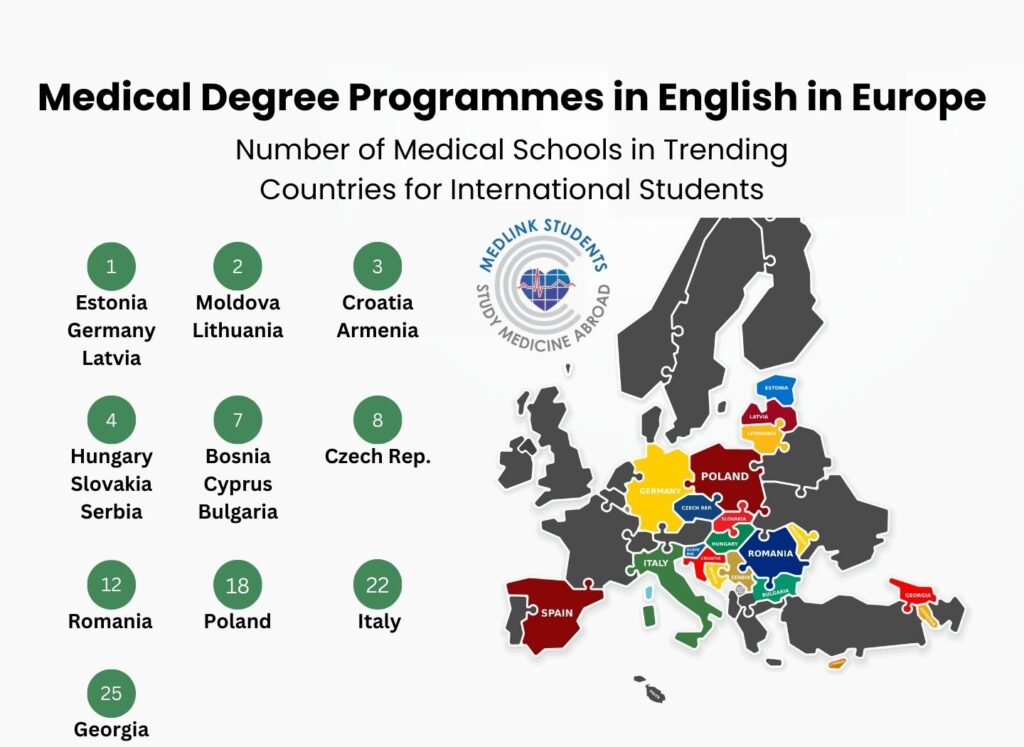

There are more than 100 medical schools in Europe where you can study medicine in English. Some of the most popular destinations are Georgia, Bulgaria, Romania, Serbia, and Poland.
For detailed reviews and information on the best medical universities in these countries, you can check our universities page.
There you will find an extensive, ever-expanding list of prestigious universities with their yearly tuition fees and courses. Alternatively, you can skip hours of research and contact a Medlink Students advisor to consult you on your options for FREE.
Medical courses in Europe are aimed at fresh high school graduates who can apply right after their GCSEs, A-levels, or the 12 grade equivalent of countries worldwide. Medical schools abroad offer English-taught programmes and have dedicated places for international students each year.
There is no need to take a gap year, gain experience, or shadow a doctor before applying. European medical schools will accept you right away as long as you meet the admission requirements.
English taught Medicine in Europe takes 6 years to graduate. The course includes 3 years of theoretical subjects and 3 years of practical knowledge and experience. The academic studies include subjects such as Anatomy and Pathology, the building blocks of the profession.
These are necessary for proceeding to the next stage of your education - applying your knowledge in practical training sessions and interactions with patients in hospitals, also known as clinical rotations.
The course sizes in Europe usually range from around 50-200 students depending on which university you choose. You’ll typically study in small groups of about ten for seminars, so you will get many opportunities to learn and practise your skills.
You will graduate as a Doctor of Medicine. Moreover, you will be able to start working in hospitals as a junior doctor right away.
The top 10 medical universities in Europe that teach in English are:
Studying medicine abroad is a relatively straightforward process, though this doesn’t make it any easier. Here is a step-by-step guide to achieving your educational dreams:
In 2020, we introduced the online medical course for years 1 to 3 in collaboration with our partner universities. You can study pre-clinical subjects of medicine from the comfort of your home with the option to switch to physical attendance anytime.
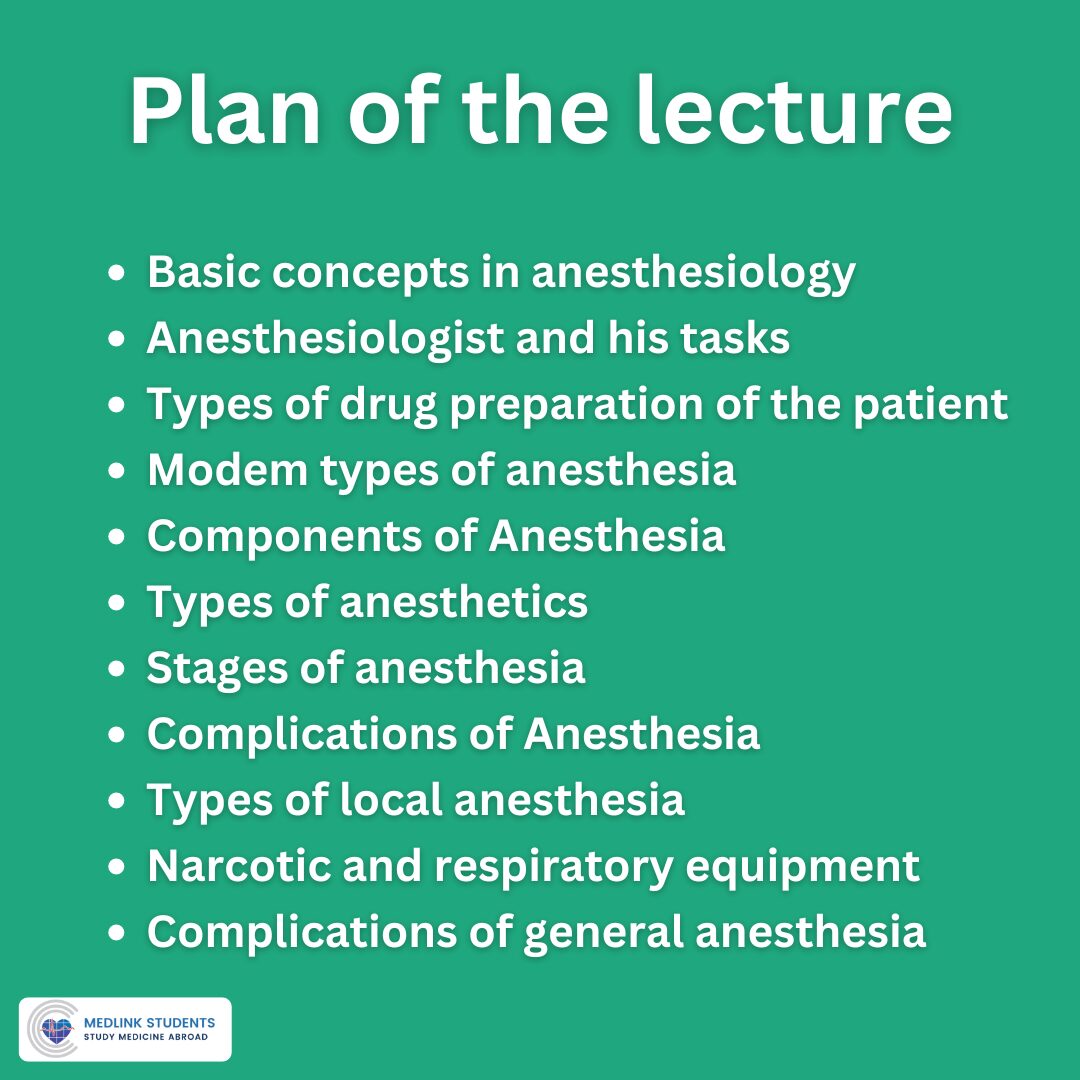

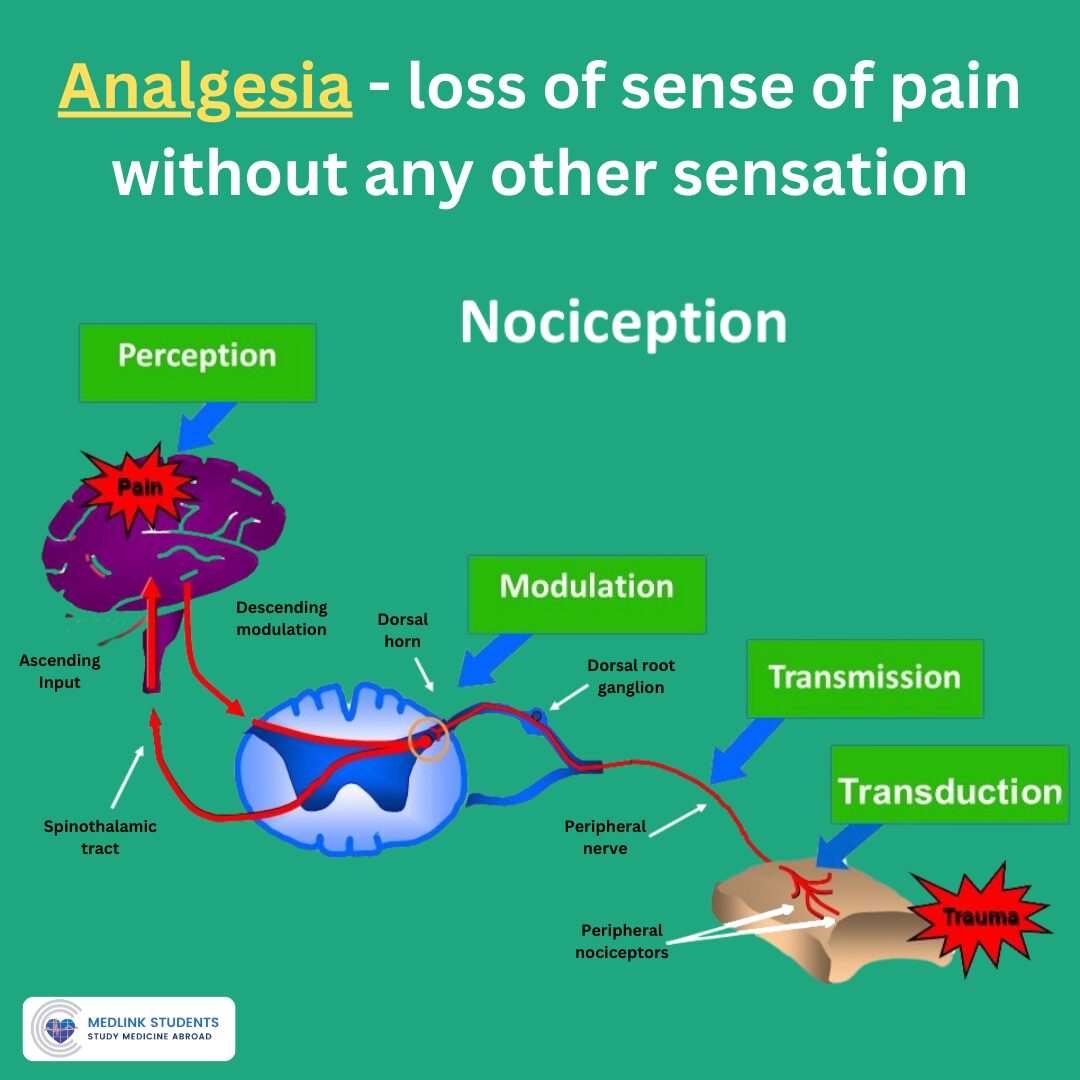

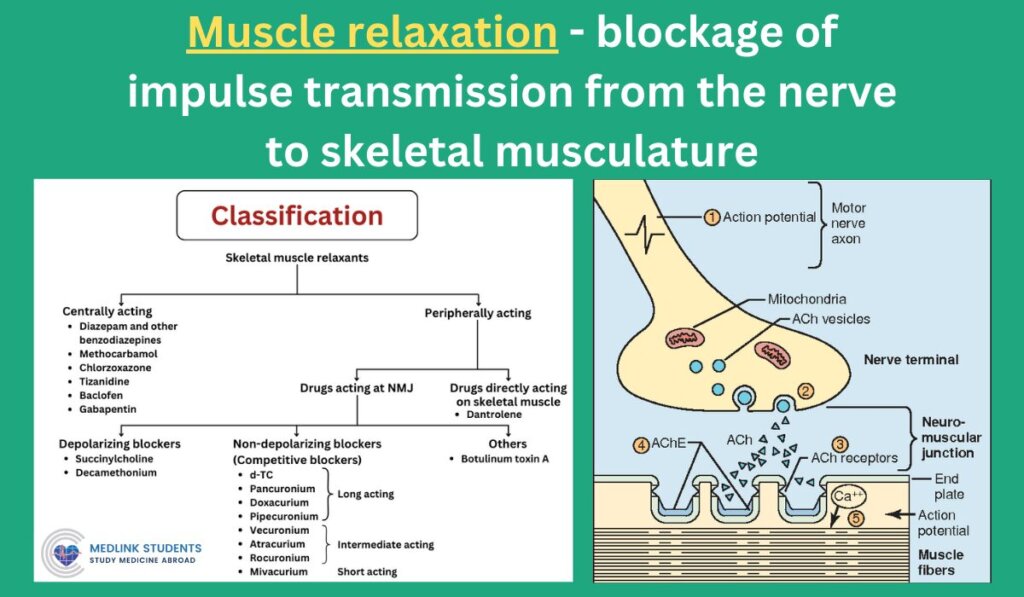

There are numerous accelerated routes for students who have studied science or health-related disciplines at the undergraduate level. Students are eligible to enter a fast-track graduate-entry dentistry or graduate entry medicine route in Europe if they hold any type of higher education diploma.
These options are usually 4 or 5 years long and depend on previous qualifications and subjects studied there. Most students who apply for the graduate entry pathway have studied Biomedical Sciences, nursing or any similar programme.
Medical school is a marathon, not a sprint and the right strategy and support can significantly help you reach the finish line successfully.
With the Student Success Programme (SSP), you’ll gain exclusive mentorship from doctors, precision-focused study techniques, and real-world clinical insights to help you master medicine. Whether it's getting accepted to a top medical school, preparing for exams, tackling difficult subjects, or excelling in hospital rotations, we’ve got your back. Don’t just get through medical school, thrive with the Student Success Programme.


Medlink Students is the leading international agency for studying medicine abroad in Europe. Thousands of students trust us each year with professional advice, handing their documents, and helping them secure a seat at top universities overseas.
Whether you’re an undergraduate student or a bachelor’s degree holder, you can schedule a call with one of our expert advisors. We will not charge you for the assessment of your documents and the consultation. The tailored advice you will get is based on your preferences about countries, universities, tuition fees, accreditation, accommodation, leisure time, and other criteria.
We collaborate closely with all our partner universities, so any claims we make will be firm. We promise 100% guaranteed admission into a medicine course abroad.
Medlink Students' comprehensive service has over 30 contractual obligations, including:
Schedule a FREE consultation now to discover your options in Medicine.
Georgia is located at the crossroads between Europe and Asia. It offers an excellent education at affordable annual tuition fees. One of the most attractive destinations for students looking to study medicine or dentistry is Georgia.
Petre Shotadze Tbilisi Medical Academy and European University of Tbilisi currently hold the title of the best medical universities in Georgia.
While it may not seem like the obvious destination at first, Georgia has become very popular with Western students looking to study medicine. What attracts them is not just the low expenses but also the world-class medical education from well-established universities.
Tbilisi is the capital and largest city of Georgia, lying on the banks of the Mt’k’vari River. This is where most of Georgia’s universities are located, and because of that, the city sports a large number of international students.
Studying medicine in English in Poland is similar to the countries above, but it’s geographically located more toward central Europe. Some of the most popular medical universities include Bialystok Medical University in Poland. The course is extremely competitive due to the high number of applicants. The MD degree is six years long and contains a lot of clinical experience.
Admission usually depends on your grades in only two of the following subjects: Biology, Chemistry, Physics, and Maths in A-levels or the final school certificate(s). Afterwards, the university will usually request to interview the candidate via Skype. The term dates are from the 1st of October till the 16th of June.
Bialystok is very accessible for international students. You can get a direct flight to Warsaw Airport in the capital, then a short coach journey or train journey to Bialystok. Halls or dormitories cost around 85 Euros per month. Other universities also teach medicine in English, such as Warsaw Medical University in the busy city of Warsaw.
A popular option for British students is Silesia Medical University in Katowice due to the higher number of UK students there. This university offers 4-year graduate entry medicine for students who hold a Bachelors degree.
Bulgaria is also an affordable option, with most medical universities charging yearly tuition of . One of the schools in Bulgaria, known as Varna Medical University, is situated on the Black Sea coast.
The universities in Bulgaria have continually evolved and improved their faculties, which is one of the reasons many international students decide to study medicine in Bulgaria every year.
Bulgaria's admission requirements are flexible, and many students apply. Hence, it’s essential to have a competitive file. Candidates go through a competitive Biology and Chemistry test to determine their academic ability.
Medlink Students helps students with relevant entrance test materials to maximise their chances of successfully passing the exams. All the universities in Bulgaria share similar standards. Students are usually attracted to Sofia Medical University due to its rising reputation and ideal location in the capital. Varna, Sofia and Plovdiv are most popular with international students studying medicine or dentistry in Bulgaria.
Plovdiv Medical University is ideal for those who don’t mind a 1-hour ride from Sofia airport. Plovdiv does have an airport, but flights to it are not as frequent as flights to Sofia. Plovdiv is a small city, but it is one of Bulgaria's oldest towns and offers a few malls and ancient artefacts. The advantage of studying in Plovdiv is that everything is within walking distance.
Pleven Medical University has a February intake only instead of the usual September intake at the other universities. Trakia University is located in a town called Stara Zagora. It is a small faculty in a medium-sized city about 3 hours away from Sofia Airport. Trakia University is also one of the few universities in Europe to study veterinary medicine in English.
Bulgaria's living costs are low, and usually, students can live comfortably at about €300-400 per month.
Many students flock to study medicine in Romania due to its affordable fees compared to other European medical universities. Schools here boast a fantastic reputation due to the advanced technological resources, skilled teachers, and a long history of teaching international students in English and French.
Schools like the Carol Davila University of Bucharest have tuition of around per year. The Titu Maiorescu University of Bucharest offers both medicine and dentistry courses, yet still has a reasonable tuition fee of per year for EU students and €9500 per year for non-EU students.
Bucharest is a vibrant city populated with professors at the top of their fields. Students who would like to save money tend to consider universities located outside the capital. Craiova city, home to Craiova Medical University, is an affordable option with annual tuition of and lower living costs.
Students tend to apply for admission at these three Romanian universities more frequently.
Generally, students who decide to study in Romania and graduate will have worldwide work opportunities. Doctors trained in Romania have a reputation for excellent clinical skills in the UK and around the world in general.
The medical schools in Hungary have appeared on the European scene over the past several years as one of the most popular options for international students, and for a reason. To make learning more exciting and satisfying, they use new interactive technologies and techniques. Not only that, but in comparison to medical schools in the UK, tuition fees are far more attractive. Living expenses are also on the low-end, as you would probably guess.
One of the best schools in Hungary is the Debrecen University Faculty of Medicine. It was established only a month before the end of WW1, making it the first medical school on campus in Central Europe. In 1951, it became an autonomous institution, and, ever since then, it has had a long-lasting reputation as one of Hungary’s finest universities.
The Semmelweis University of Budapest is another great English teaching medical school in Hungary. The Faculty of Medicine of the University of Semmelweis, established in 1769, is the oldest and largest faculty with over 4,500 students, making it one of the most successful on the continent. It is considered to be the best medical university in Hungary.
Pavol Jozef Šafárik University’s Faculty of Medicine in Kosice, Slovakia, has rapidly become a popular destination for studying medicine or dentistry in English. This is due to the high standard of teaching and the rising reputation of the medical universities in Slovakia.
This large faculty has been teaching for 65 years and channels all its comprehensive experience into training some of the world’s most skilled doctors. The big city of Kosice offers a vibrant and lively lifestyle with activities for everybody. In addition to its world-renowned teaching, the university provides scientific research opportunities to enthusiastic students.
The city offers the most extensive botanic garden and zoo, lots of sightseeing areas, restaurants, busy high streets, modern malls, engaging nightlife and many more. The university is located 12-minutes from the Kosice International Airport, making it convenient and accessible.
The tuition fees for the medical course are €10,000 per year, while the dental course is about €11,000 per year. Another reason students choose to go to Slovakia is due to its very affordable living costs.
Germany is undoubtedly one of the world leaders in medical education. However, medicine in Germany is taught only in German, so you will have to learn the language before going there.
Luckily, Medlink Students has partnered with one university that recently started promoting English courses, and that’s the University of Targu Mures Medical Campus Hamburg (UMCH). The tuition fee starts at per year, and after finishing the second year, you have the choice to remain in Hamburg and pay €28,000 per year or go to Targu Mures in Romania, and continue your education in English, but pay only €6,000 per year.
The Acibadem University in Istanbul is one of the rising stars on our list. There you can study a number of health-related sciences, most notably medicine and pharmacy, in English.
The tuition fees per year are for medicine and €13,700 for pharmacy. Acibadem University attracts international students from all around the world due to considerable investments in modern technologies and training centres.
Near East University in North Cyprus initiated the medicine program in English in 2008 and the Dentistry program in 2007. The initial three years focus on pre-clinical education. Therefore, in the fourth and fifth years, the students are trained in clinics where group studies are carried out. The sixth-year is the internship year. Near East University ranks first in Cyprus.
An alternative medical faculty is the University of Nicosia Medical School which runs a relatively young private 4-year MBBS course for a hefty tuition fee of /year. This university is fairly new to teaching medicine in English; hence it’s still finding its feet on the ground. The university is currently most popular among Greek students compared to any other nationality simply because English is not a commonly spoken language in Cyprus. As the years go by, maybe the university will gain more experience and become a more suitable destination for international students.
A few medical universities in Italy teach medicine in English: Bari BEMC, Bologna, Milan International Medical School, Naples – Federico II, Naples Luigi Vanvitelli (SUN), Pavia – Harvey, Rome La Sapienza and Rome Tor Vergata, Turin/Turino IMS. The University of Siena is the only university to teach Dentistry and Dental Prosthodontics in English. Nevertheless, Italy is still a popular option for students who decide to enrol in medicine in Europe.
The tuition fees are around €4,000 per year, with some small discounts for EU students with low family income. However, their entry requirements are very complicated, and the number of applicants is much higher than the number of places available. Usually, around 3500-4000 international students apply for 204 places in Italy.
Public universities currently select students using the IMAT exam (a similar international version of BMAT). The IMAT exam is fairly difficult and not easy to prepare for. The exam usually takes place in September, and the candidates’ results are ranked in October.
It might be easier to achieve medical admission in private universities in Italy. However, their fees are slightly higher (€6,850-€20,000 per year), but they are also means-tested and can offer financial aid in some cases. It usually costs EU students around €10,000 per year. Private universities in Italy include Cattolica Univesity, which has 20 EU places, and 30 non-EU places, and tuition range from 7,000€ to 16,000€. The more popular destination is Humanitas Medical school which has a more accessible version of the IMAT for EU and non-EU students and tuition fees of about €10,000– €20,000 per year. San Raffael International University has the highest tuition at €20,000 per year.
Serbia is considered to be among the best destinations for international medical students. Those who wish to study medicine in Serbia will find old, historic universities, many of which are located in smaller, quieter cities. Nis and Novi Sad, for example, have less than half a million citizens but are prime destinations for students from around the world.
Much like in other countries, the medical programme in English lasts 6 years: 2 years pre-clinical studies, 3 years clinical, and then an internship in the final year. The course is very competitive, with some English programmes (such as the University of Nis) offering as few as 50 spots. This means that high grades in science subjects, as well as a good performance in the entrance exams, are crucial to being accepted in Serbia.
Students who prefer bigger cities to smaller ones will probably thrive in Belgrade, the capital, with a population of over 1.7 million people. Its local medical school, the University of Belgrade, hosts more than 100,000 students across its 31 faculties. It allows students to not only study medicine in English, but also dentistry and pharmacy, alongside pre-med courses.
Despite the competitive entry, there are many advantages to studying medicine in Serbia. All universities we work with provide world-class medical education and are accredited by the GMC, AMA and many more international organisations. Beyond that, both the tuition fees and living costs are very low, which allows students to study in Serbia and then return to practise in their home country, or anywhere in the world they wish.
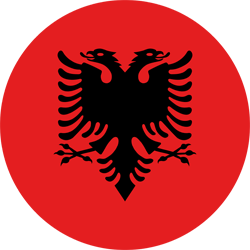

Studying Medicine in Albania in English offers high-quality education with internationally recognised degrees, early clinical experience at top hospitals & clinics, and a welcoming Mediterranean environment, perfect for international students pursuing medical education abroad.


I did join a university in Ukraine, but then thankfully, with Medlink Students, I was able to transfer ... I've done my research, and with the help of Medlink Students I picked a great university which fits my budget ...I told them, look, this is black and white. I've got this much that I'm able to spend on tuition fees. Where can I go? They narrowed it down a lot. And then from there I was able to decide ..It was very easy because I dropped a message and then I was able to schedule a call and literally every question that I had was answered loud and clear. So I was happy with that... Then Medlink Students have arranged for me someone to pick me up from the airport to take me straight to the hotel where I booked it. So I wasn't very worried about that. As long as my safety was fine, I was fine. And they reassured that for me. That was amazing.
The experience was really amazing. At first, I was skeptical about how things will turn out, of course, because I was moving initially from Turkey to a new place, but with the help of Medlink Students, I found things very easy because I didn't have to stress about my application issues. I only had to deal with my own issues, like the visa processing and my traveling. But the rest was all catered for, so the journey was really smooth and I loved it. And they also made prior arrangements for me with a school I found really helpful because coming into a new country, you know nobody, you don't know where to start. They already had set, like, a full ground for me, so i can come in, settle in and kick off my journey.
... first of all, I cannot imagine this process of application process or transfer process without the help of Medlink Students. They have been very supportive since the first moment, helping me before, during and after I came here. Serbia, they picked me up at the airport. They helped me in the first day at the university in the registration, also with my papers for the residence permit, get a SIM card for my phone, also open my bank account, and they are always there, allowed to help me with everything I need, every doubt about the school or the city or any paper. So for me was a good experience and still be a good experience, because I feel like I have someone to help me every time I need it. That's great.
There are more than 100 medical universities in Europe where you can study Medicine, Dentistry, Veterinary, and Pharmacy.
Tuition fees vary considerably depending on the university. For example, European University In Tbilisi Georgia charges just around per year, while the tuition fees at Acibadem University in Turkey are per year.
Absolutely, yes! There are more than 100 European universities that teach medicine in English. To learn more about them, check out the list that we created. It contains top medical schools in Europe that offer medicine, dentistry, pharmacy, and veterinary courses in English.
Medical education in Europe is 6 years.
Entry requirements for medical school vary highly depending on different universities. Some medical universities in Europe have entrance exams in Biology, Chemistry, and English others don't. However, for sure, you will need:
Yes, but it's not just okay. It’s a perfect opportunity! Suppose you choose to study medicine in Europe. In that case, you will benefit from affordable tuition fees and living costs, flexible entry requirements, high-quality education, modern medical facilities, and a globally recognised degree.
Several medical universities allow students to transfer their credits, meaning they can continue studying for the next consecutive year at a different medical university without being held back from moving.